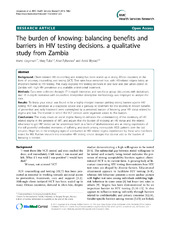| dc.contributor.author | Jürgensen, Marte | en_US |
| dc.contributor.author | Tuba, Mary | en_US |
| dc.contributor.author | Fylkesnes, Knut | en_US |
| dc.contributor.author | Blystad, Astrid | en_US |
| dc.date.accessioned | 2013-03-22T08:52:27Z | |
| dc.date.available | 2013-03-22T08:52:27Z | |
| dc.date.issued | 2012-01-05 | eng |
| dc.identifier.issn | 1472-6963 | |
| dc.identifier.uri | https://hdl.handle.net/1956/6446 | |
| dc.description.abstract | Background Client-initiated HIV counselling and testing has been scaled up in many African countries, in the form of voluntary counselling and testing (VCT). Test rates have remained low, with HIV-related stigma being an important barrier to HIV testing. This study explored HIV testing decisions in one rural and one urban district in Zambia with high HIV prevalence and available antiretroviral treatment. Methods Data were collected through 17 in-depth interviews and two focus group discussions with individuals and 10 in-depth interviews with counsellors. Interpretive description methodology was employed to analyse the data. Results 'To know your status' was found to be a highly charged concept yielding strong barriers against HIV testing. VCT was perceived as a diagnostic device and a gateway to treatment for the severely ill. Known benefits of prevention and early treatment were outweighed by a perceived burden of knowing your HIV status related to stigma and fear. The manner in which the VCT services were organised added to this burden. Conclusions This study draws on social stigma theory to enhance the understanding of the continuity of HIV related stigma in the presence of ART, and argues that the burden of knowing an HIV status and the related reluctance to get HIV tested can be understood both as a form of label-avoidance and as strong expressions of the still powerful embodied memories of suffering and death among non-curable AIDS patients over the last decades. Hope lies in the emerging signs of a reduction in HIV related stigma experienced by those who had been tested for HIV. Further research into innovative HIV testing service designs that do not add to the burden of knowing is needed. | en_US |
| dc.language.iso | eng | eng |
| dc.publisher | BioMed Central Ltd. | eng |
| dc.rights | Attribution CC BY | eng |
| dc.rights.uri | http://creativecommons.org/licenses/by/2.0/ | eng |
| dc.title | The burden of knowing: balancing benefits and barriers in HIV testing decisions. a qualitative study from Zambia | en_US |
| dc.type | Peer reviewed | |
| dc.type | Journal article | |
| dc.description.version | publishedVersion | en_US |
| dc.rights.holder | Copyright 2012 Jürgensen et al; licensee BioMed Central Ltd. This is an Open Access article distributed under the terms of the Creative Commons Attribution License (http://creativecommons.org/licenses/by/2.0), which permits unrestricted use, distribution, and reproduction in any medium, provided the original work is properly cited. | |
| dc.identifier.doi | https://doi.org/10.1186/1472-6963-12-2 | |
| dc.identifier.cristin | 935061 | |
| dc.source.journal | BMC Health Services Research | |
| dc.source.40 | 12 | |
| dc.source.14 | 2 | |

